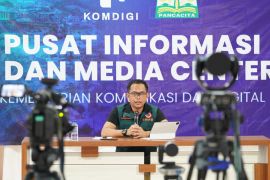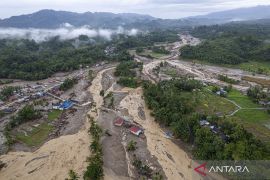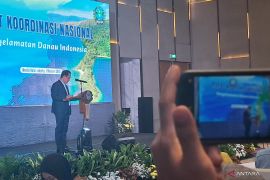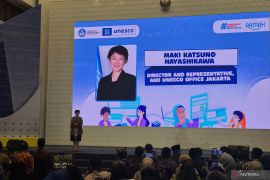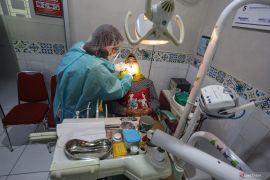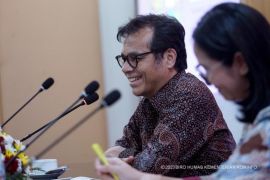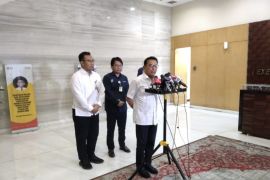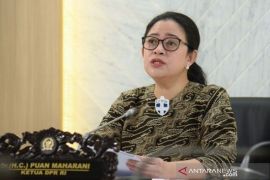"The dwelling time has decreased; but honestly, we acknowledge that logistics costs are still a problem that we are trying to resolve," Coordinating Minister for Maritime Affairs Luhut Binsar Pandjaitan said.Jakarta (ANTARA News) - The Indonesian government is trying to reduce inefficiency at seaports, among others, by reducing the length of loading and unloading period, or dwelling time.
Though it has successfully reduced the waiting time significantly from about 10 days in 2015 to three days now, yet logistics costs at ports are still high.
"The dwelling time has decreased; but honestly, we acknowledge that logistics costs are still a problem that we are trying to resolve," Coordinating Minister for Maritime Affairs Luhut Binsar Pandjaitan said, Thursday (May 4).
Hence, the government is proposing a single tariff system for multiple modes of transportation, while others suggest that port standardization should be set to cut logistics costs. The single tariff system will be good, if it is handled by the technical ministry, notably the Ministry of Transportation.
According to Edy Putera Irawady, deputy for trade and industry coordination of the Office of the Coordinating Minister for Economic Affairs, the technical ministry is the appropriate agency to handle the single tariff system for multimode transportation.
"This is good as a regulation is in place. A government regulation on it has been completed. It means that the transportation ministry has to secure its authority first," Irawady noted at a public discussion themed: "Unraveling the Tangled Yarn of Logistics Flow at Indonesian Ports," in Jakarta last month.
Irawady proposed that the Ministry of Transportation should establish a special department and have the directorate general handle the single tariff system. The single tariff system is important because Indonesias geographic conditions require multiple transportation modes for distribution of goods. It is impossible for Indonesia, which is an island country, not to have multiple transportation system.
With this single tariff system, cost for delivery of goods from Jayapura (Papua) to Jakarta will only have to be paid once. There is no need to pay the sea fare, train cost, truck payment and others. The single tariff system only requires payment to be made once, although the delivery would involve multiple modes of transportation. "It is enough to pay once, for instance, Rp10 thousand per kilogram of goods for a delivery to Jakarta," Irawady maintained.
He stated the single tariff system could reduce the logistics costs up to 38 percent. After all, logistics contribute 40 percent to retail costs and 70 percent to transportation "So far, transportation contribution to inflation is high. In January 2017 alone, transportation contributed 11.2 percent," Irawady added.
Besides the single tariff system, another measure to reduce logistics costs is to set a common management standardization for main seaports in Indonesia.
State-owned seaport operator PT Pelabuhan Indonesia II (Pelindo II) conducted a simulation on the management of main ports in Indonesia, which if adopted would cut national logistics cost by about 3.6 percent.
President Director of PT Pelindo II Elvyn G. Gasassya, at the International Associations of Ports and Harbors (IAPH) Conference in Bali, Wednesday, last week (May 10), said the standardization should, among others, include operational activities, efficiency aspect, productivity and financial book-keeping. "We conducted management simulation of main ports in Indonesia. If the same standard is jointly applied, it would reduce logistics cost by 3.6 percent," Gasassya explained.
Coordinating Minister for Maritime Affairs Luhut Binsar Pandjaitan remarked the government was trying to reduce logistics costs which are still high.
"We hope that this year, the problem of cost at the port can be addressed," he mentioned, claiming he wanted to save logistics costs in Indonesia.
Therefore, the government is now examining logistics components one by one to map details that can be trimmed. For example, the cost of Terminal Handling Charge is quite expensive.
In the meantime, businesses hoped that the government would prepare the logistics sector.
With Indonesia experiencing highest annual compound trade growth in ASEAN, the government must prepare the logistics sector to face the competitive global trade, according to the Indonesian Forwarder and Logistics Association (ALFI).
"Indonesias Compound Annual Growth Rate (CAGR) in the 2013-2017 period stood at 11.7 percent, freight forwarding was 11.8 percent, and small and express delivery was 21.7 percent. Thus Indonesias volatility is the highest among ASEAN member countries," ALFI Chairman Yukki Nugrawan Hanafi said in Jakarta on Tuesday (May 16).
Compared with the logistic growth in other ASEAN member countries, Indonesia is fortunate. The volatility in other ASEAN nations has begun to go down.
For example, the CAGR of Singapore is only 7.3 percent, the Philippines is 11.3 percent, and Thailand is 9.7 percent, which all happened in the same interval period of 2013-2017.
This shows that the paradigm of logistics services has begun to shift to Indonesia which has the largest population in ASEAN. There is an increase in the use of technology by the people.
Indonesia has began to enter the global market, where trade obstacles are declining and competition is increasing. In the broad term, the national logistic market size tends to experience volatility or increase, he noted.
Such a condition reflects the high market demand in Indonesia amid the mushrooming of e-commerce businesses or goods and services trade carried out through the cyber world, he observed.
Consumers at home now are increasingly smart at getting quality but cheap domestic and imported products. "Although it once experienced global economic crisis and weakening of exports, the Indonesian logistics sector is able to survive, with even the demand from consumers continuing to increase," he remarked.
ALFI will cooperate with the government and encourage policies that will improve the logistics sector, both in the region and the central government, one of which is by improving the infrastructure, transportation and information technology services.(*)
Reporter: Andi Abdussalam
Editor: Heru Purwanto
Copyright © ANTARA 2017
